ENGLISH 6
TOPICS INDEX
- Past Simple & Present Perfect
- Will & Might
- Present Perfect Continuous
- Will & Going to
- Reported Speech
- Zero and First Conditionals
- Imperatives in Conditionals
- First and Second Conditional
- Third Conditional
- Passives
- Modal Verbs 1
- Modal Verbs 2
- Questions
- Time Clauses

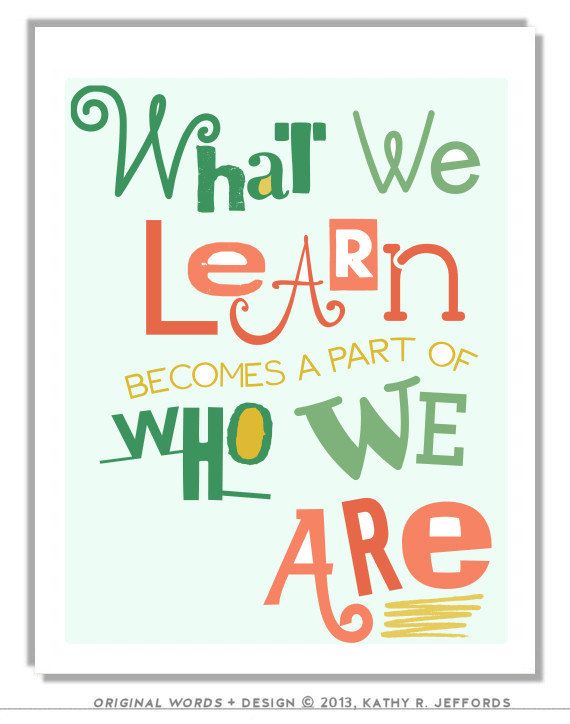
Comparatives and Superlatives
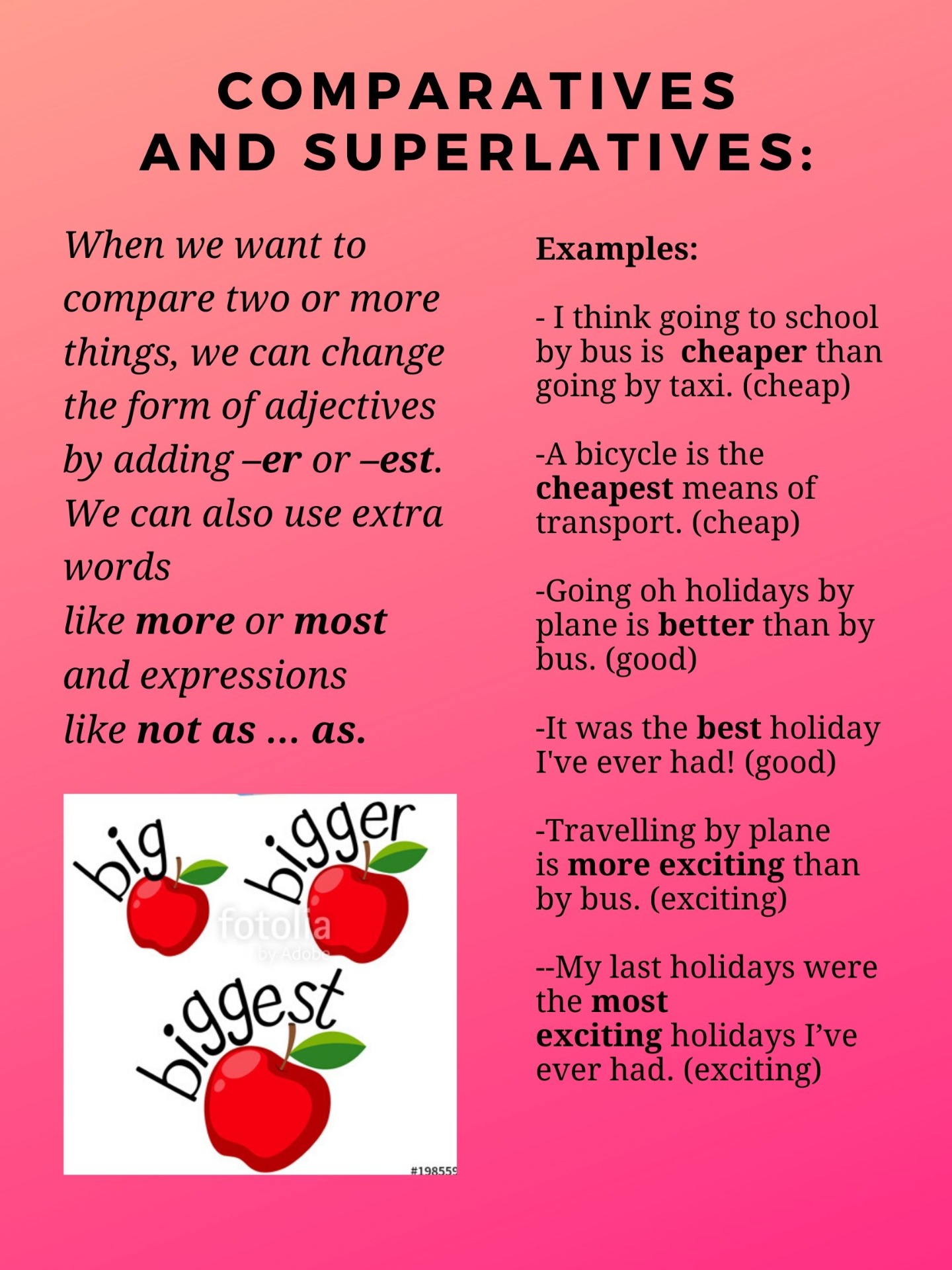
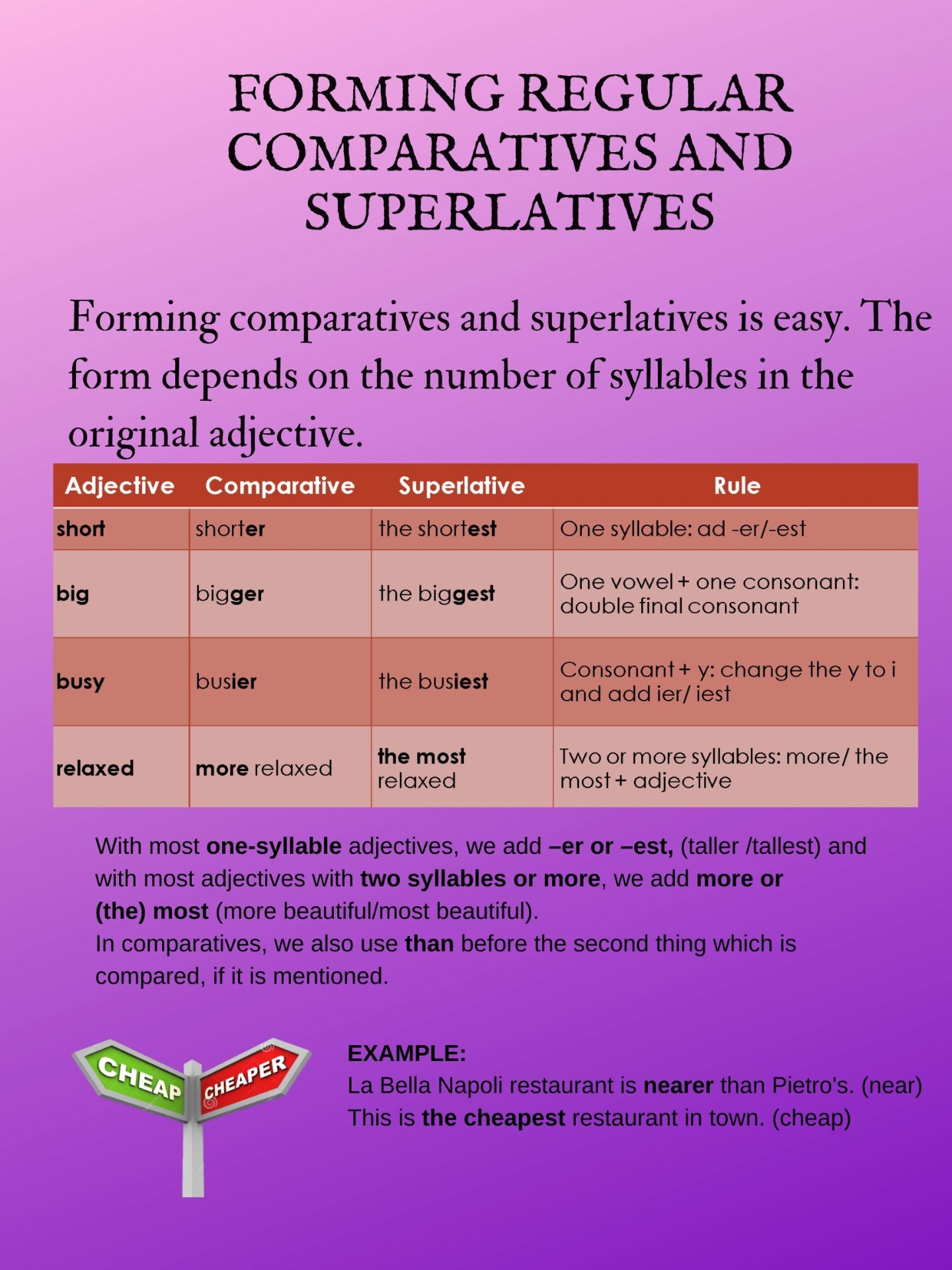
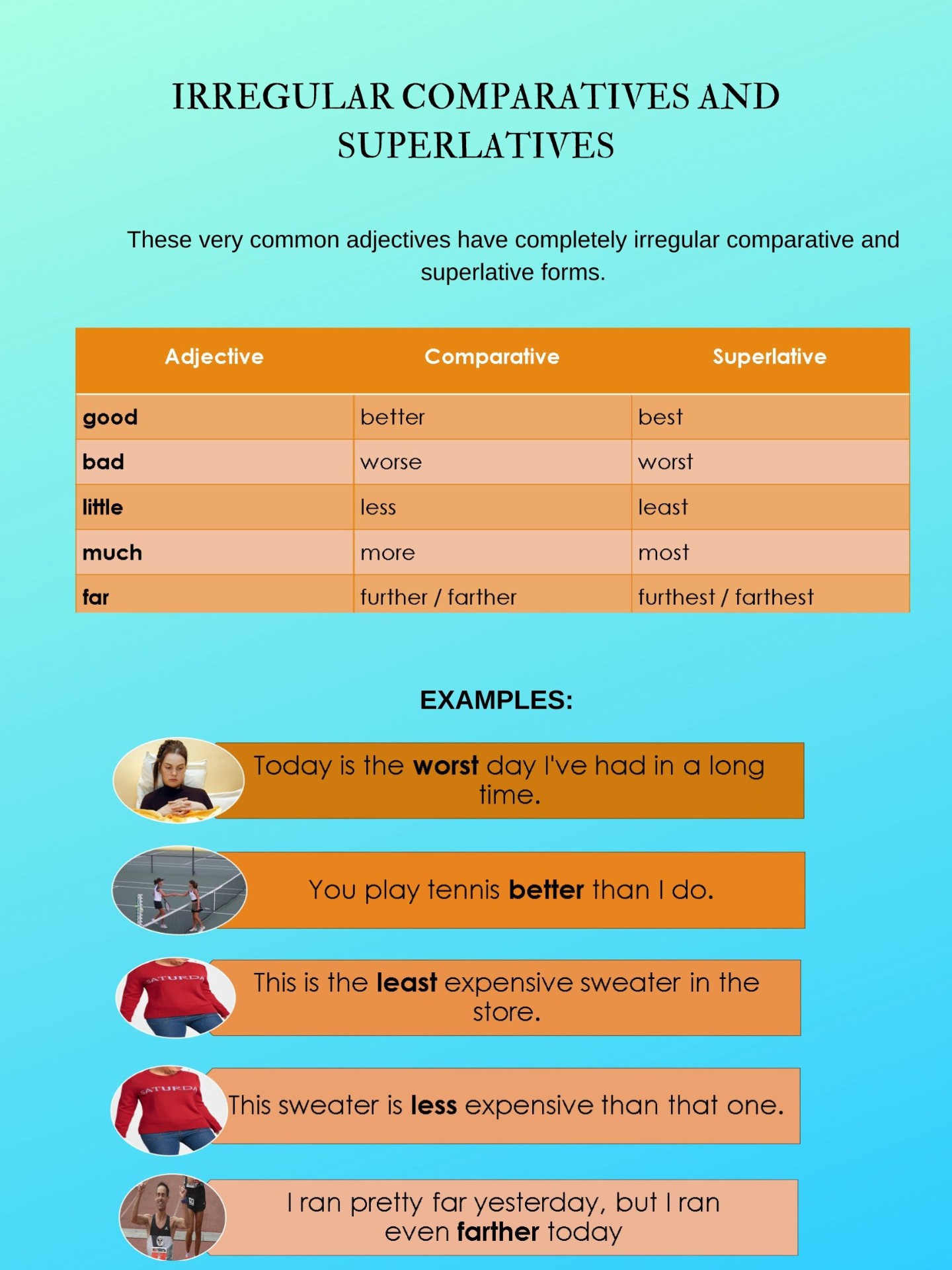
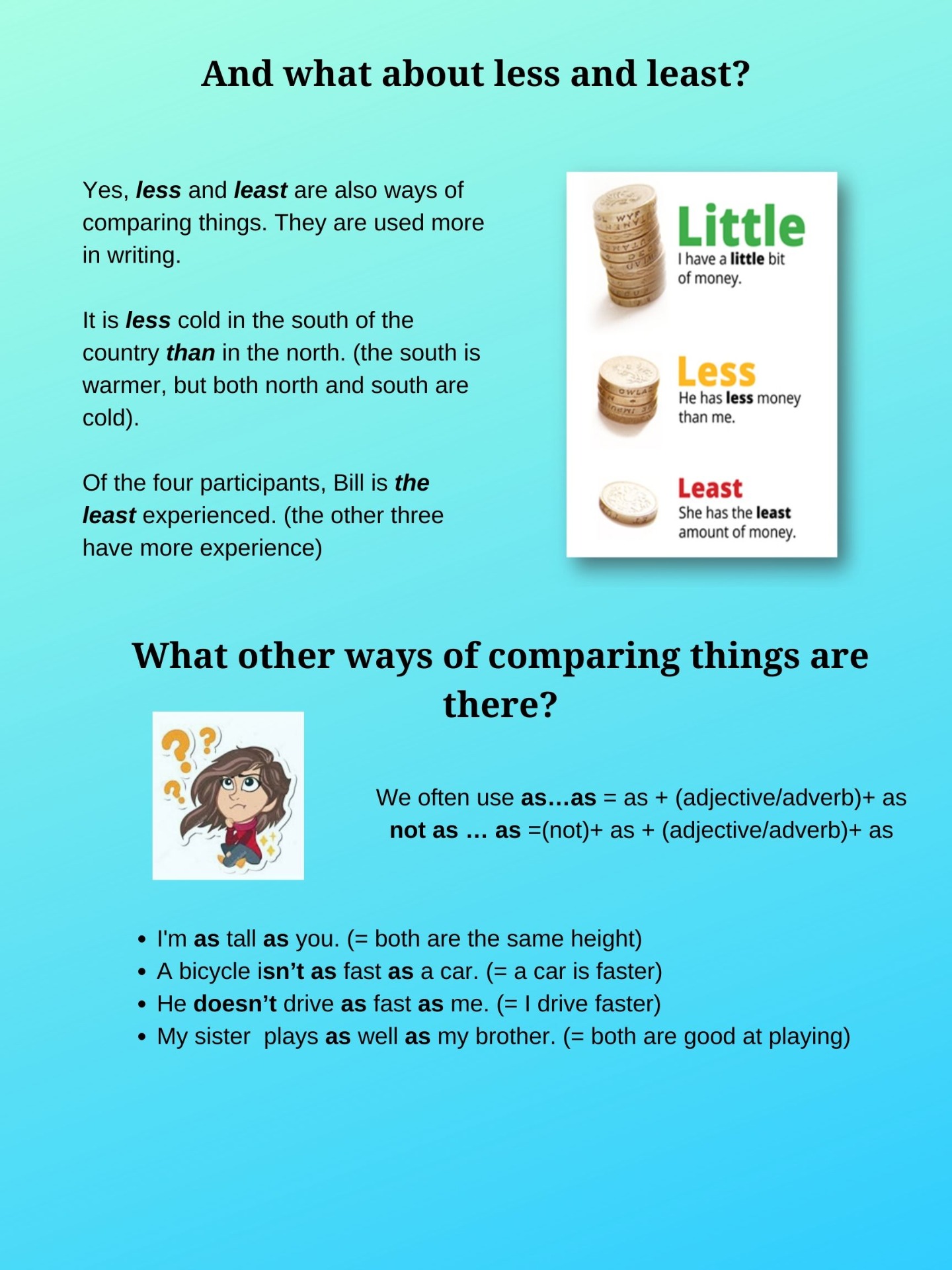
Exercises to practice Comparatives and Superlatives
Other exercises to practice Comparatives and Superlatives
WILL & MIGHT

Both "will" and "might" are modal auxiliary verbs. This means that they are followed by the infinitive of the verb without "to":
"It will rain later." (Not "it will to rain...")
"It might rain later."
We use "will" when we are sure that something will happen.
"It will be sunny later." (100% probability)
We use "might" when something is less sure.
"It might rain later. Take an umbrella with you." (50% probability)
The negative forms are:
"It won't..."
"It won't snow until December."
"It might not..."
"It might not be sunny at the beach."
Exercises to Will & Might
Other exercises to practice Will & Might
- https://www.eli.es/uploaded_files/practice/t4/exercises/oldt4jpredict/oldt4jpredict.htm
- https://learnenglish.britishcouncil.org/es/intermediate-grammar/predicting-future
- https://www.english-at-home.com/will-might-going-to/
- https://www.aulafacil.com/cursos/ingles/a1/verbos-modales-iii-may-might-ejercicios-l15485
Present
Perfect Continuous

Exercises to practice Present Perfect Continuous
Other exercises to practice present perfect continuous
Will & Going to





Exercises to practice Will and Going To
Other exercises to practice predictions with will
and might /going to
- https://www.eli.es/uploaded_files/practice/t4/exercises/oldt4jpredict/oldt4jpredict.htm
- https://www.englisch-hilfen.de/en/exercises/tenses/will_going_to_future.htm
- https://www.english-at-home.com/will-might-going-to
- https://www.ejerciciosinglesonline.com/new-exercises/ex2-will-vs-going-to/
- https://www.englisch-hilfen.de/en/exercises/tenses/will_going_to_future.htm
Reported Speech







Exercises to practice Reported speech
Other exercises to practice Reported speech
- https://www.englisch-hilfen.de/en/exercises/reported_speech/backshift.htm
- https://elt.oup.com/student/solutions/int/grammar/grammar_06_012e?cc=mx&selLanguage=ehttps://elt.oup.com/student/solutions/int/grammar/grammar_06_012e?cc=mx&selLanguage=
- https://elt.oup.com/student/solutions/int/grammar/grammar_06_022e?cc=mx&selLanguage=enhttps://elt.oup.com/student/solutions/int/grammar/grammar_06_022e?cc=mx&selLanguage=en
- https://elt.oup.com/student/solutions/preint3rdedition/grammar/grammar_09_022e?cc=mx&selLanguage=enhttps://elt.oup.com/student/solutions/preint3rdedition/grammar/grammar_09_022e?cc=mx&selLanguage=en
- https://www.ego4u.com/en/cram-up/grammar/reported-speech/exercises?05
- https://www.englisch-hilfen.de/en/exercises/reported_speech/questions.htm
- https://www.ejerciciosinglesonline.com/exercises-and-theory/ex3-estilo-indirecto/
- https://www.ejerciciosinglesonline.com/new-exercises/ex1-estilo-indirecto-reported-speech/
- https://www.test-english.com/grammar-points/b1/reported-speech-indirect-speech/
- https://www.proprofs.com/quiz-school/story.php?title=reported-speech-test-1
Zero and First Conditionals




Exercises to practice Zero and First Conditionals
Other exercises to practice Zero and First conditionals
- https://www.proprofs.com/quiz-school/story.php?title=zero-and-first-conditionals
- https://www.englishexercises.org/makeagame/viewgame.asp?id=10753
- https://www.ego4u.com/en/cram-up/tests/conditional-sentences-1
- https://www.englishexercises.org/makeagame/viewgame.asp?id=10753
- https://es.liveworksheets.com/worksheets/en/English_as_a_Second_Language_(ESL)/Conditionals/Zero_and_first_conditional_worksheet_ns567084bn
Imperatives in Conditionals
We use an imperative + the present simple in the if-clause when we tell or ask people to do things.
Just ask if you need any help.
We can also use when, before, as soon as or until instead of if when we refer to future events.
- Call me when you arrive.
- Please lock the windows before you leave.
- Don't leave the house until I get there.
Other exercises to practice Imperatives in Conditionals
First and Second Conditional
FIRST CONDITIONAL
The first conditional (also called conditional type 1 ) is a structure used for talking about possibilities in the present or in the future.
1. The structure of a first conditional sentence
A first conditional sentence consists of two clauses, an "if" clause and a main clause:

If the "if" clause comes first, a comma is usually used. If the "if" clause comes second, there is no need for a comma:

SECOND CONDITIONAL
We use the second conditional (also sometimes called the "present unreal conditional") to talk about a situation that is not real or is unlikely to occur and its imagined consequences. For Example:
- I might say, "If I had a million dollars, I would go on a trip around the world."
I don't have a million dollars. That situation is unreal. But if I did have a million dollars, the consequence would be that I would go on a trip around the world.
Notice that we are thinking about a future condition. We use the past simple tense to talk about the future condition. We use WOULD + base verb to talk about the future result. The important thing about the second conditional is that there is an unreal possibility that the condition will happen.
2. The structure of a second conditional sentence
The second conditional is formed with two clauses, an "if" clause and a main clause:


If the "if" clause comes first, a comma is usually used. If the "if" clause comes second, there is no need for a comma:
Examples:
- If I won the lottery, I would travel around the world.
- If it were not raining, we could go out.
- If I wasn't watching TV now, I would be playing football.
- If you studied, you might get good results.
Sometimes, we use should, could or might instead of would, for example: If I won a million dollars, I could stop working.
Exercises to practice First conditional & Second conditional
Other exercises to practice First conditional & second conditional
First Conditional
- https://elt.oup.com/student/solutions/preint3rdedition/grammar/grammar_07_022e?cc=mx&selLanguage=enhttps://elt.oup.com/student/solutions/preint3rdedition/grammar/grammar_07_022e?cc=mx&selLanguage=en
- https://elt.oup.com/student/solutions/preint3rdedition/grammar/grammar_07_022e?cc=mx&selLanguage=en
- https://elt.oup.com/student/solutions/preint3rdedition/grammar/grammar_07_022e?cc=mx&selLanguage=en
- https://web2.uvcs.uvic.ca/elc/studyzone/330/grammar/1cond1.htm
- https://www.englishexercises.org/makeagame/viewgame.asp?id=3226
- https://www.englisch-hilfen.de/en/exercises/if_clauses/type_1_statements.htm
Second Conditional
- https://www.englishexercises.org/makeagame/viewgame.asp?id=3227#a
- https://www.learnenglish-online.com/grammar/tests/2ndconditional.html
- https://www.learnenglishfeelgood.com/grammar-secondconditional2.html
- https://www.ego4u.com/en/cram-up/tests/conditional-sentences-2
- https://www.perfect-english-grammar.com/second-conditional-exercise-1.html
Third Conditional


Exercises to practice Third Conditional
Other exercises to practice Third conditional
- https://www.ego4u.com/en/cram-up/grammar/conditional-sentences/type-3/exercises?02
- https://elt.oup.com/student/solutions/int/grammar/grammar_09_022e?cc=mx&selLanguage=en
- https://www.ecenglish.com/learnenglish/lessons/third-conditional
- https://www.englishgrammar.org/conditional-grammar-exercise/
- https://agendaweb.org/verbs/conditional-third-exercises.html
Passives


Exercises to practice Passives
Other exercises to practice Passives
- https://www.englisch-hilfen.de/en/exercises_list/passiv.htm
- https://www.englisch-hilfen.de/en/complex_tests/passive1/index.php
- https://elt.oup.com/student/solutions/preint3rdedition/grammar/grammar_10_012e?cc=mx&selLanguage=enhttps://elt.oup.com/student/solutions/preint3rdedition/grammar/grammar_10_012e?cc=mx&selLanguage=en
- https://www.perfect-english-grammar.com/passive-exercise-5.html
- https://www.englisch-hilfen.de/en/exercises/active_passive/active_or_passive.htm
Modals Verbs 1

CAN, COULD, WOULD
Modal auxiliary verbs are used to moderate the main verb that is to enhance or restrict the verb to a certain context.
We use can and could to:
- To talk about ability (in the present or past)
Loren is a secretary. She can speak German and French.
Nancy could swim like a pro by the age of 11.
- To make requests
Can you hand me the stapler?
Could I use your computer to email, my boss? (a bit more formal)
- To make offers (can)
Can I help you?
I can send the report if you want.
- To give or refuse permission (can)
You can use my mobile phone
You can't go in there. It's private
- Talk about possibility or impossibility
Any child can grow up to be president.
You can't get through them. Their lines are always busy.
I think we could increase our sales by adopting better marketing strategies (could express future possibility)
Extreme rain could cause the river to flood the city. (future possibility.

Reference Source:
Exercises to practice Modals 1
Other exercises to practice Modals 1
Ability
Requests
- https://usefulenglish.ru/grammar/modal-verbs-exercise-four
- https://web2.uvcs.uvic.ca/elc/studyzone/330/grammar/330-modals-polite1.htm
- https://www.funteaching.it/project/engl2005/basic/Could%20you.htm
Requests, offers and invitations
MODALS 2
Should, Have to, Need to & Must
(Modals of necessity and obligation)

We often use must, need to and has/have to to say that something is compulsory or necessary.
1. Must and have to are used to show necessity and obligation.
Examples:
- We must get the medicine to the sick children.
- We must hurry to catch our flight to Italy.
- They have to take the bus to work.
- I have to learn English to get a promotion.
The past form for have to, and must is had to (past obligation).
Example:
- I had to go practice my English harder since I'm
2. Should and Shouldn't : We use should and shouldn't to give advice, suggestions or to talk about what we think is right or wrong.
You should means something like I think it is a good idea for you to do it.
You shouldn't means something like I think it is a bad idea for you to do it.
Should is used to express the opinion of a speaker and often follows I think or I don't think.
Examples:
- You look tired. I think you should take a few days off.
- Alice works very long hours. She should talk to her boss.
- I have an English test tomorrow. You shouldn't worry you have worked really hard.
- I never have enough money. I don't think you should spend a lot in iTunes.
3. We use "don't have to" or "don't need to" when something isn't necessary. (absence of necessity)
Examples:
- Mr. Smith is a primary school teacher, so she doesn't have to work in summers.
- We have a lot of milk in the fridge. You don't need to buy any.
- Carl and Joseph work from home, so they don't have to go to the office every day.
- I don't have to get up early tomorrow since I am on holiday.
4. "Must not" suggests that you are prohibited from doing something. (Things are forbidden or against the law).
"Do not have to" suggests that someone is not required to do something. (It is not necessary).
Examples:
- You must not eat that. It is forbidden, it is not allowed.
- You don't have to eat that. You can if you want to, but it is not necessary.
Exercises to practice Modals 2
Other exercises to practice Modals 2
Must and Have to
Should/Shouldn't
Mustn't and don't have to
Must, have to and should (obligation and advice
PAST PERFECT

Exercises to practice Questions
Other exercises to practice Past Perfect
https://www.learnenglish.de/games/tenses/pastperfecttest.html
https://www.focus.olsztyn.pl/en-exercises-past-perfect-test-1.html#.XAfuoNtKiM8
https://www.perfect-english-grammar.co
TIME CLAUSES
We use time clauses to provide information about actions or events in the past, present and future.
The time clauses in the English language are introduced by conjunctions such as after, as soon as, before, till, until, when, while.
Examples:
- Do you remember when you had your first job interview? (past time)
- When I go to the cinema, I always buy popcorn. (present time)
- When I find the missing documents, I'll bring them to you. (future time)
IMPORTANT CONSIDERATIONS IN TIME CLAUSES:
- Clauses need a subject and a verb.
- A time clause must be connected to a main clause.
- A time clause can come after or before the main clause.
- When the time clause comes before the main clause, a comma separates them.
- The tense in the time clause can be in present o past tenses. We do not use the future tense (will) in a time clause.
Examples:
- I look after the children while she goes to London.
- When I come back, I'll do exercise.
- I'll do it when I've finished writing this letter.
A. When you want to say that two events happen at the same time, you use a clause with as, when or while:
- We arrived as they were leaving.
- While she was studying, I was listening to the radio.
- When I was watching TV, my brother was doing exercise.
B. Sometimes one event interrupts another event, so you can use: when or while.
- He was having dinner when the telephone rang.
- While I was studying, my friends arrived.
C. When you want to say that one event happens before another event, you use a time clause with after, as soon as, before, or when.
- Can I see you before you go, Helen?
- As soon as I get the tickets, we'll send them to you.
- When the phone rang, I answered it.
- After Frank ate dinner, he went to the movies.
D. When you want to talk about when a situation ends, you use a time clause with till or until and a present or past tense.
- We'll support them till they find work.
- She waited until the train had gone.
- I stayed there talking to them until I saw Sam.
E. When you use the present perfect in a time clause, it refers to a future situation.
- We won't know the results until we have received all the sales reports.
- She will send you the report after she has talked to her boss

Exercises to practice Time clauses
Other exercises to practice Time clauses
- https://www.tolearnenglish.com/exercises/exercise-english-2/exercise-english-13727.php
- https://www.e-grammar.org/time-clauses/test1-exercise1/#topad
- https://www.focus.olsztyn.pl/en-english-grammar-time-clauses-exercises.html#.YBDzo-hKjIU
- https://www.englishexercises.org/makeagame/viewgame.asp?id=11992






